Bruxism Treatment
What Is Bruxism Treatment?
Bruxism is a common condition that affects many people at some point in their lives. It involves the grinding of teeth and clenching of the jaw, often occurring unconsciously during sleep, though it can also happen while awake.
Bruxism is recognized as one of the most prevalent sleep-related disorders. The act of chewing is primarily controlled by the brain, but during sleep, subconscious muscle activity can take over, leading to grinding and clenching. This condition is often linked to symptoms such as headaches, earaches, anxiety, stress, eating disorders, and even depression.

Why Should Bruxism Be Treated?
Ignoring bruxism can lead to several serious oral health issues, including:
- Gum Recession & Tooth Loss – Excessive grinding wears down soft tissues, weakens teeth, and creates deep pockets where harmful bacteria can thrive, potentially leading to decay and bone loss.
- Facial Pain & Headaches – Constant clenching can cause muscle fatigue and discomfort in the face and jaw, sometimes resulting in severe headaches.
- Tooth Damage – Uneven wear on the chewing surfaces of teeth may lead to fractures, which, if left untreated, could require extensive restorative work.
- Jaw Joint Issues (TMJ Disorders) – Severe cases of bruxism can contribute to temporomandibular joint (TMJ) problems, including inflammation and arthritis, making jaw movement painful.
Treatment Options for Bruxism
Although there is no definitive cure for bruxism, several effective treatments are available to help manage the condition and protect your teeth:
A personalized acrylic mouthguard, designed from impressions of your teeth, can be worn during sleep to reduce the impact of grinding and prevent damage.
This specialized appliance, which only covers the front teeth, is fitted in-office to reduce jaw muscle contractions and prevent grinding of the back teeth.
A carefully administered injection of Botox® into the jaw muscles can help reduce excessive grinding while still allowing normal speech and chewing.
Once bruxism is managed, we offer various restorative treatments to repair and enhance your smile, including crowns, gum grafting, and crown lengthening.
